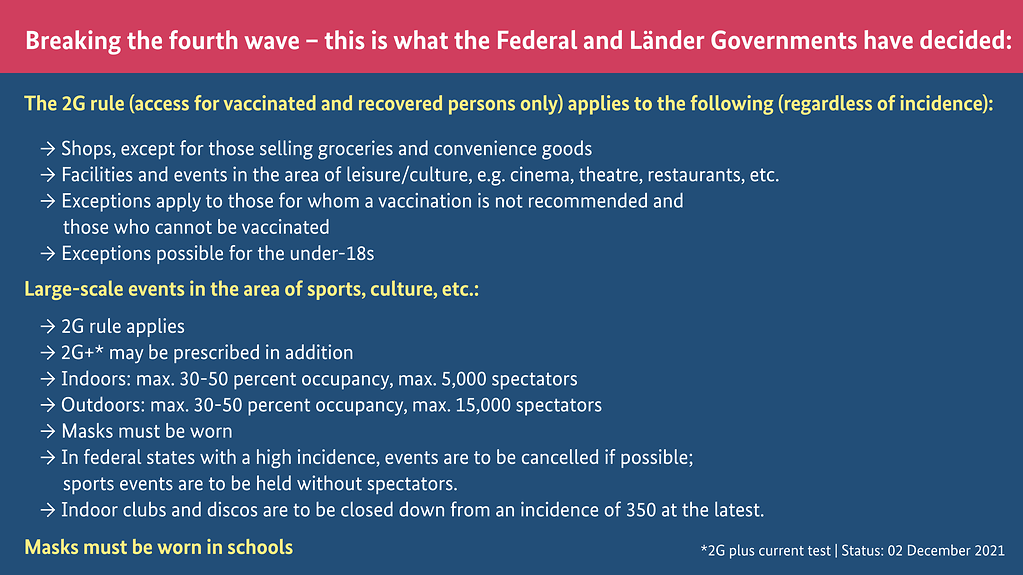Federation-Länder decision
The Federal and Länder Governments have jointly decided on measures to break the fourth wave of the coronavirus pandemic. Although infection rates are beginning to slow down, the overall levels are still far too high, said Federal Chancellor Merkel. The measures are intended to reduce the number of infections and relieve the burden on the healthcare system.
4 min reading time

The situation is serious, so the Federal and Länder Governments have decided to impose further measures.
Photo: Federal Government
In view of record infection figures and the growing pressure in terms of hospital capacity and patient transfers, an “act of national solidarity” was now necessary, said Federal Chancellor Angela Merkel. “Nationwide measures have always been effective,” said Merkel. In order to break the fourth wave, the Federal and Länder Governments have jointly decided on measures to reduce infections and ease the situation in hospitals. Contacts have to be reduced and the vaccination campaign has to be implemented more quickly.
Up to 30 million vaccinations by the end of the year
The aim is to make vaccinations available by Christmas to all those who opt for an initial vaccination and all those who require a regular second or booster vaccination. Up to 30 million vaccinations are to be administered.
As Vice Chancellor Olaf Scholz stressed: “As everyone knows, we’re in a very, very difficult situation. This has to do with the fact that although large numbers of our citizens are vaccinated, it still isn't enough to prevent a new wave of infections spreading through the country.” For this reason, Scholz urged all those who have not yet got their vaccination to do so now: “This really is crucial: the fact that a large proportion of citizens have not yet seen their way clear to getting vaccinated has obvious consequences – that’s something we can be absolutely sure of. It’s very, very important to change this now.”
In future, dentists, pharmacists and nursing staff will also be allowed to provide vaccinations – the Federal Government will be expanding the group of authorised persons here, said Scholz.
Change in vaccination status
As the protection offered by the coronavirus vaccination wanes continuously from about the fifth month onwards, people’s vaccination status will change unless they receive a booster. “Permanent recognition as double jabbed – and therefore fully vaccinated – won’t be possible,” said Federal Chancellor Merkel. “So it’ll be very important for people to obtain a booster jab to retain their fully vaccinated status.” Everyone would have the opportunity to renew their vaccination status, she added.
2G rule regardless of incidence
The 2G rule will apply in shops and at cultural and leisure events in future. In other words, only those who have been vaccinated against the coronavirus or who have recovered from an infection will be allowed access. This rule already applies in some federal states, and it is now to be imposed nationwide – regardless of regional incidence. In addition, the so-called 2G plus test rule can also be imposed. Shops selling groceries and convenience goods are exempt from the 2G rule.
Contact restrictions for the unvaccinated
“There will also be strict limitations on all private gatherings and contacts wherever an unvaccinated person is present,” said Merkel. If not all participants are either vaccinated or recovered, the limit is: one’s own household plus a maximum of two other persons. Children up to the age of 14 are exempt from this rule.
Sports and large-scale events
Large-scale events in the area of sports, culture and the like will be subject to significant restrictions. At indoor events, only 30 to 50 percent of capacity may be used, with a maximum total of 5,000 spectators. At outdoor events such as in football stadiums, only 30 to 50 percent of capacity may be used, with a maximum total of 15,000 spectators.
Indoor clubs and discos are to be closed down from an incidence of 350 at the latest.
Vaccine mandate for specific groups and for the population as a whole
The Federal Government will impose a vaccine mandate for employees at specific types of institution such as care facilities for the elderly and hospitals.
The Federal Government and Länder welcome the fact that the Bundestag intends to impose a general vaccine mandate in the near future. This might take effect as soon all those yet to be vaccinated are able to receive their vaccination, i.e. from around February 2022.
“We have advocated vaccination using all the channels available to us, but there is still a vaccination gap: as a result, those who have received their vaccination are still being subjected to restrictions. It also means that the healthcare system is at the point of overload – or even past that point in some regions,” said Merkel.
New Year’s Eve and New Year’s Day
The decision has also been made to impose a ban on New Year’s Eve fireworks this year, as was the case last year. A nationwide ban on public gatherings and meetings will apply on New Year’s Eve and New Year’s Day.